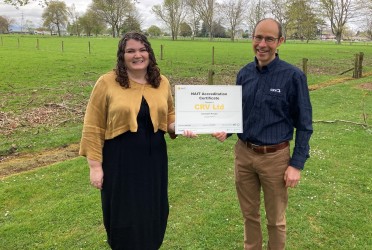 Milestone for NAIT as CRV becomes first accredited provider under new standards
Milestone for NAIT as CRV becomes first accredited provider under new standards
Representatives from OSPRI officially presented CRV with its accreditation certificate in Hamilton.
National Manager Quality, Compliance and Assurance Melissa Bailey says the intention of the new voluntary accreditation system is to give farmers more confidence that organisations handling and managing their NAIT data, such as saleyards and meat processors, meet the highest industry-agreed standards.
Under the old system, more than 150 providers were accredited. Farmers were getting notices for not complying and there were some instances where the movements were recorded incorrectly.
Ms Bailey says farmers using an accredited NAIT provider means that the organisation is backed by OSPRI.
"If anything goes wrong, OSPRI can provide help and support to remedy the situation. Even after these providers become accredited, our team works closely with them to monitor their performance regularly and make sure they do the job right every time."
 National Aerial Operations Plan 2023 — consultation now closed
National Aerial Operations Plan 2023 — consultation now closed
Thank you to everyone who provided feedback on our proposed National Aerial Operations Plan 2023. We received close to 400 submissions from a range of stakeholders and interested parties around the country.
These submissions are now being considered and will be in touch with responses to those who made submissions either individually or as a group.
While the feedback period closed on 30 September, you can still have a look at the proposed National Aerial Consultation Plan. We intend to publish a summary of submissions and our responses to key concerns soon.
 The good life - supporting lifestylers in the Wairarapa
The good life - supporting lifestylers in the Wairarapa
The OSPRI team held a successful event for lifestylers in the Wairarapa last week at Farmlands in Greytown.
Great giveaways, a tasty BBQ and interesting speakers helped draw in the crowd. Regional Partner Tracey Beauchamp said the main purpose of the event was to educate lifestylers about NAIT, but there were a number of organisations talking about a range of topics including animal health, how animals are bought and sold, and other helpful tips and tricks.
Representatives from Property Brokers, Farmlands, Vet Services, Federated Farmers and Country Livestock helped with running the event and based on the positive feedback, there is already talk of holding another one in the next few months.
“There are a lot of lifestyle blocks in the Wairarapa and Wellington region and there’s a genuine interest in that area to understand what the obligations are for lifestylers and how they can improve their farming practices,” said Tracey.
 Foot-and-mouth disease - Play your part, update NAIT
Foot-and-mouth disease - Play your part, update NAIT
In the unlikely event foot-and-mouth disease was to enter New Zealand, it would be devastating to the primary sector and our rural communities.
OSPRI is working closely with MPI and the primary sector to ensure we are optimally utilising the tools and data we have available to support a response team in the event of an outbreak.
Farmers can contribute to the accuracy of the data the biosecurity response team will need in the event of an outbreak by doing the following:
• ensure your contact details in NAIT are correct
• tag and register all of your NAIT animals
• record all movements within 48 hours
• sign up to MyOSPRI.
Improve biosecurity by using MyOSPRI to record sheep mob movements
Sheep farmers can help improve the accuracy and usability of data a biosecurity response team will need during an outbreak, by signing up to MyOSPRI. This is our new online customer portal, which has replaced the electronic Animal Status Declaration (eASD) system.
Sheep farmers can provide mob-level tracing by using MyOSPRI to:
- register their farm locations and pick-up addresses
- send online farm-to-farm and farm-to-meat processor ASDs (paper ASDs are still required for saleyards).
Paper-based ASDs aren’t collated in a centralised database, which means it’s harder to access them quickly to help trace disease.
Using MyOSPRI to send ASDs to other farms
Did you know that you can use MyOSPRI to send electronic Animal Status Declarations (ASDs) to other farmers, as well as sending livestock to slaughter?
 MPI biosecurity advice for farmers with pigs
MPI biosecurity advice for farmers with pigs
Feeding untreated meat waste (often known as "swill") to pigs, could introduce serious animal diseases, costing billions of dollars to New Zealand's economy.
New Zealand’s layered biosecurity system works to prevent the introduction of diseases, and we have strict rules that control the importation of meat.
Illegally imported meat can introduce exotic diseases such as foot-and-mouth disease (FMD) and African swine fever (ASF). Feeding this meat to pigs can spread these diseases. Untreated meat waste being fed to pigs is believed to be the cause of the 2001 FMD outbreak in the United Kingdom.
If you collect or supply any food waste intended to feed pigs, there are guidelines to help you. You can read more about it on MPI's website.

